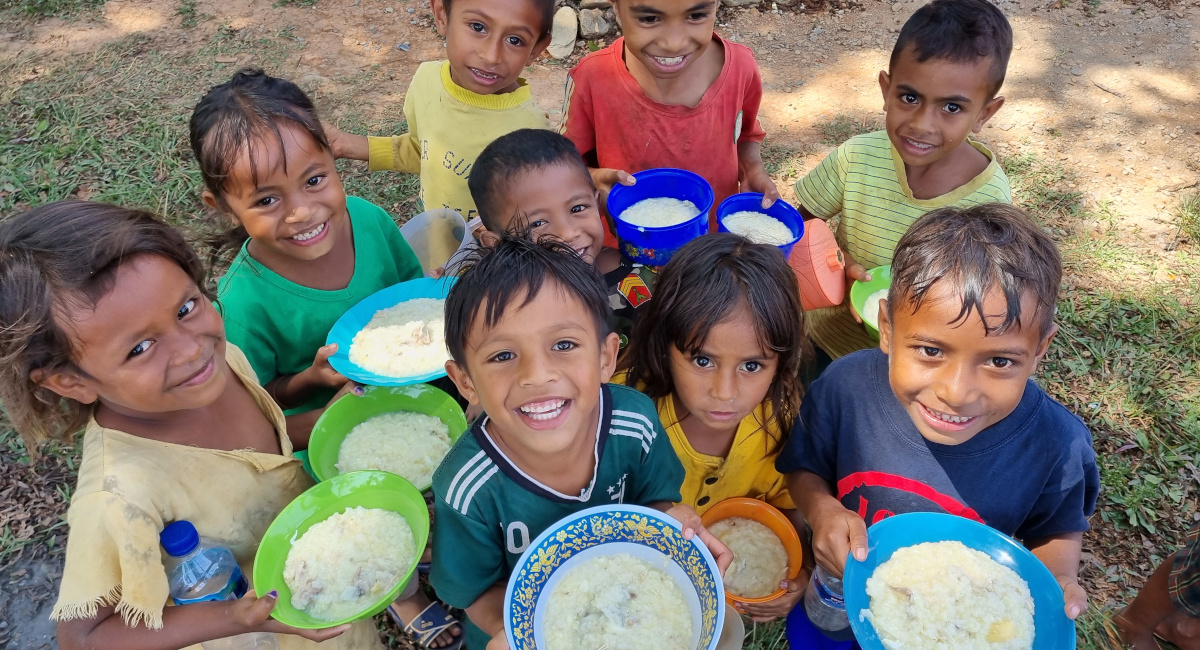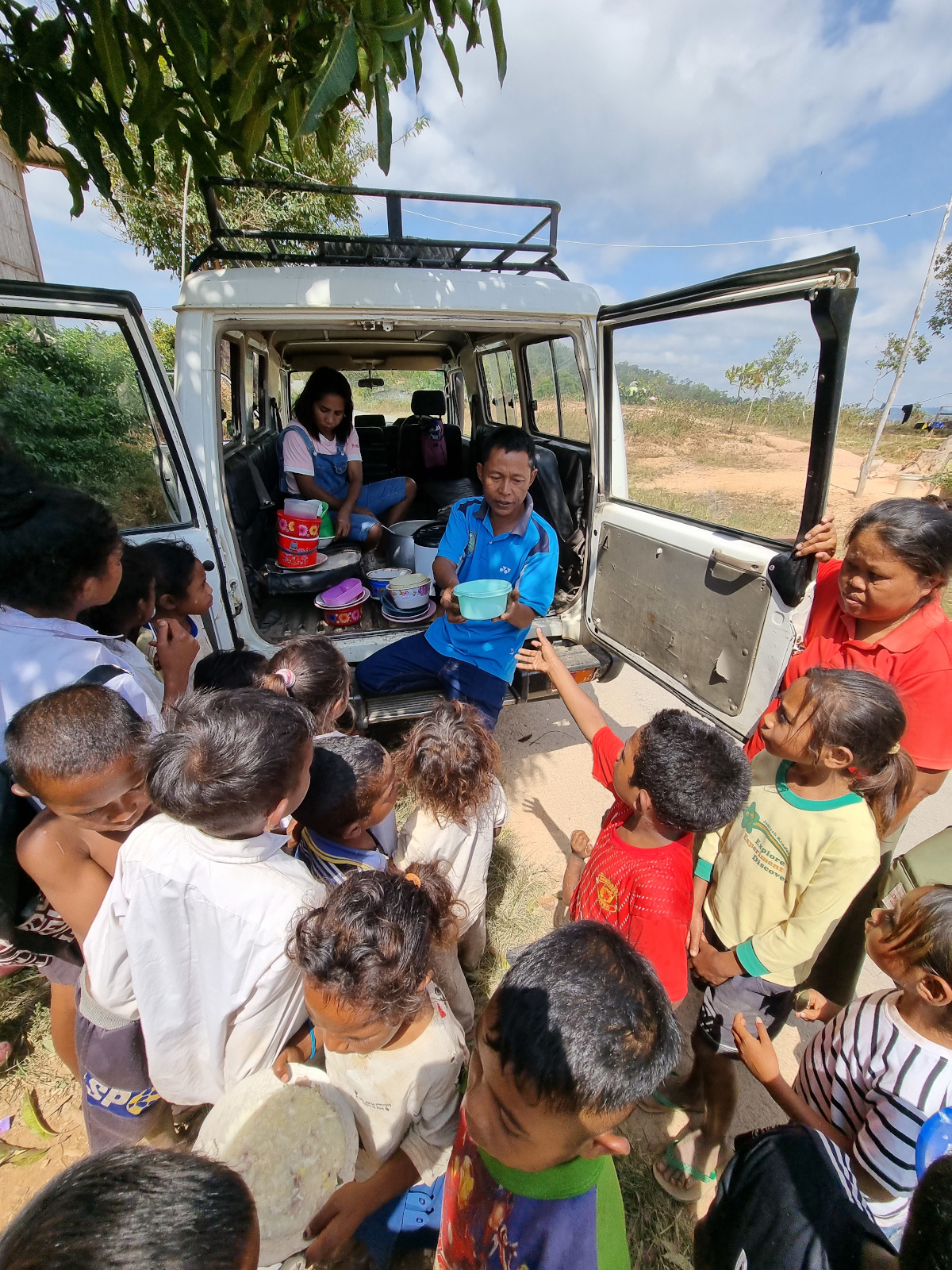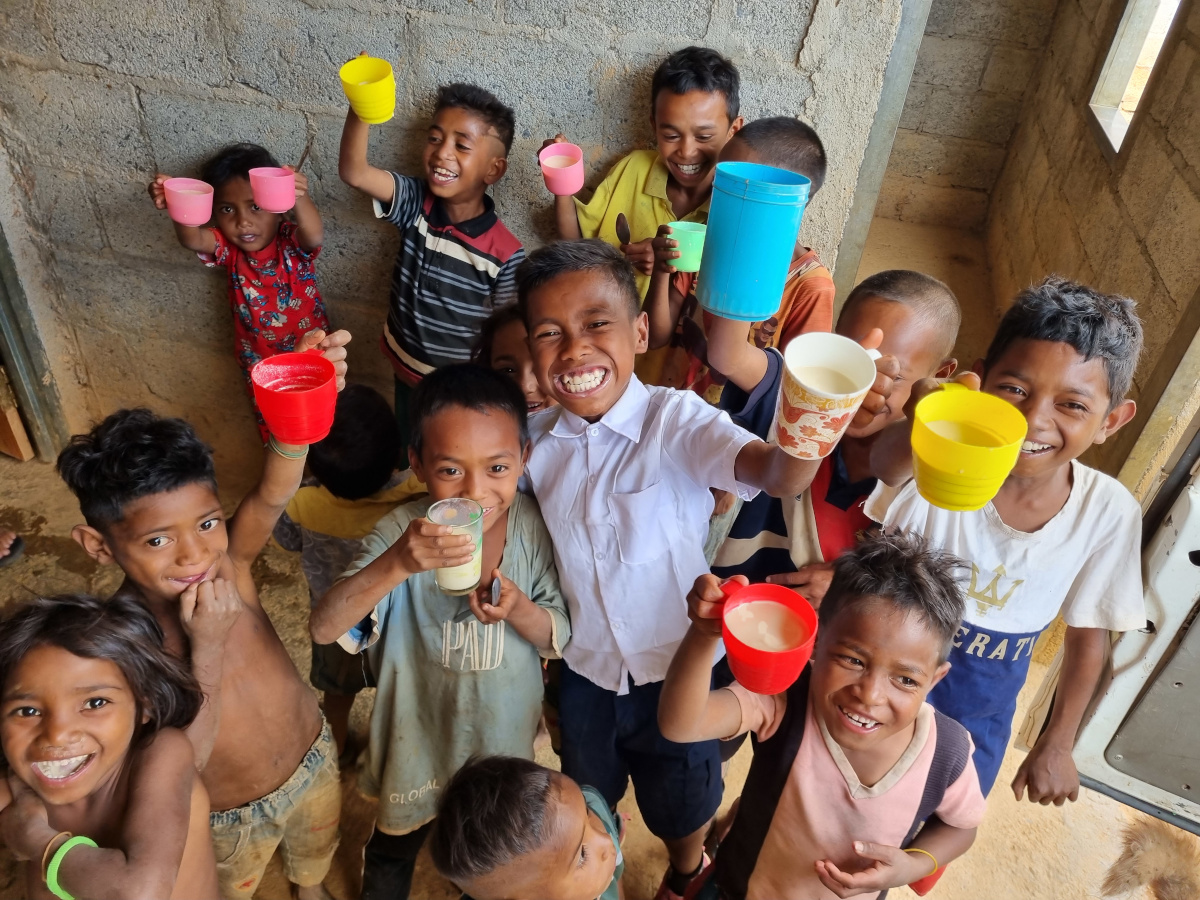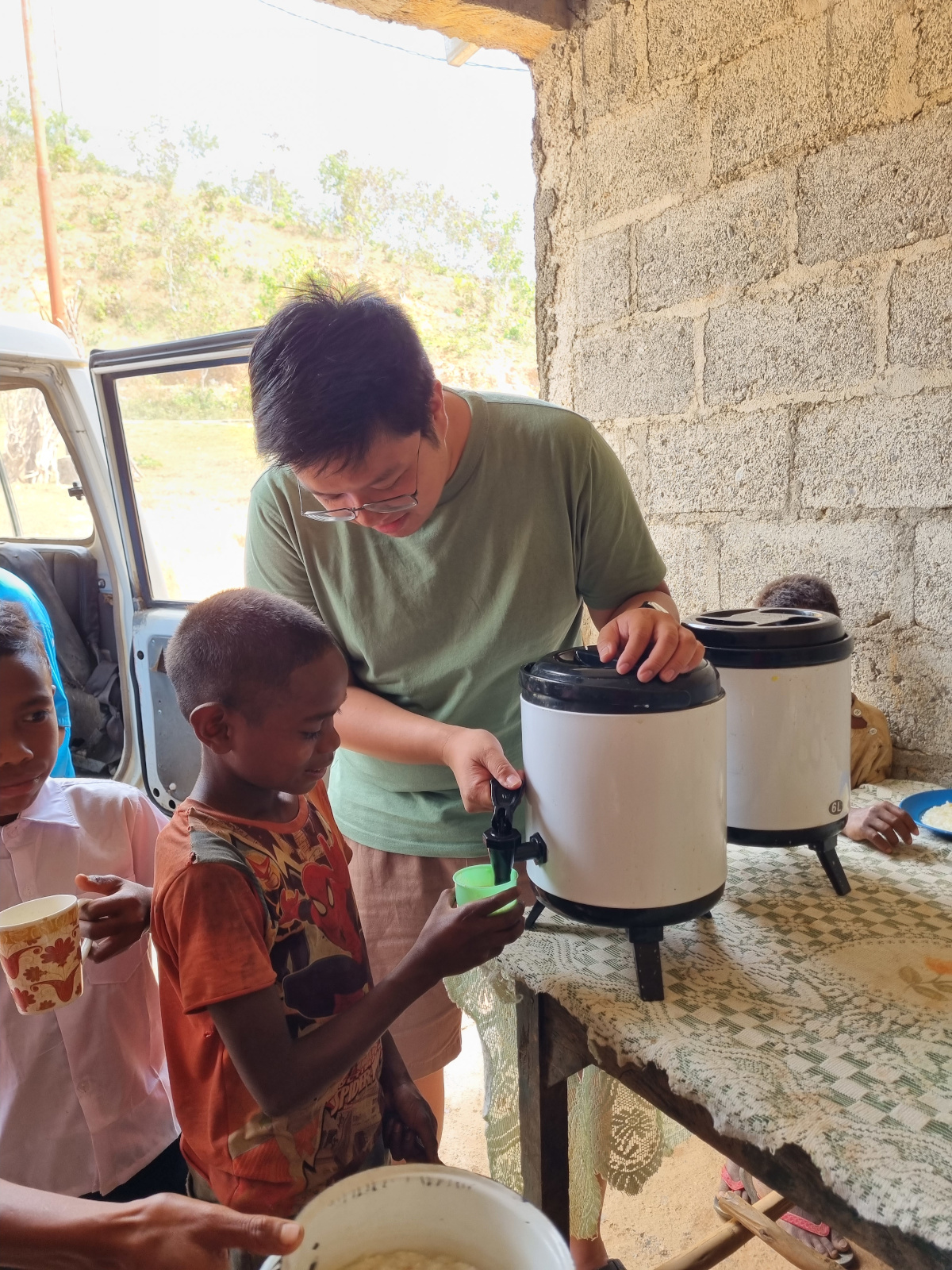 Since 2005, three years after landing in Timor-Leste, Fr Bong Abad Santos SJ has been feeding malnourished children in the far-flung villages of Railaco. During a recent immersion trip in Timor, I joined Christina, Nora, and Mario on one of their feeding sessions. Fr Bong, who is also a medical doctor, does not often participate in the feedings since his presence is more urgently needed in the mobile clinic.
Since 2005, three years after landing in Timor-Leste, Fr Bong Abad Santos SJ has been feeding malnourished children in the far-flung villages of Railaco. During a recent immersion trip in Timor, I joined Christina, Nora, and Mario on one of their feeding sessions. Fr Bong, who is also a medical doctor, does not often participate in the feedings since his presence is more urgently needed in the mobile clinic.
As we drove to the mission area, I spotted mountains that appeared to be fertile grounds for abundant fruit and vegetable production. I saw pigs, goats, and chickens roaming along the road or being tended near the houses. I recalled asking Fr Bong why the children were malnourished when it seemed that the essential sources of nutrients were readily available. He explained that cultivating vegetables and raising animals is a time-consuming process that often falls short of sustaining families. Many parents work in the coffee fields, leaving the children to rely on cassava, sweet potatoes, and a few vegetables for sustenance.
 The meals that Fr Bong provides for the children are fortified with vitamins and protein to address the nutritional gaps in their daily intake. The rice porridge is generously loaded with chicken meat and crushed hard-boiled eggs and accompanied with a cup of vitamin-rich milk.
The meals that Fr Bong provides for the children are fortified with vitamins and protein to address the nutritional gaps in their daily intake. The rice porridge is generously loaded with chicken meat and crushed hard-boiled eggs and accompanied with a cup of vitamin-rich milk.
The real problem, though, is the prevalence of junk food, such as instant noodles. “They feel full but receive no nutrients. They are not growing!” said Fr Bong, who, together with his dedicated team, has been bringing nutrition to the many undernourished children in Railaco for 15 years. In 2020, he was recognised by Timor-Leste President Francisco Guterres with the Sérgio Vieira de Mello Human Rights Award for his quiet yet powerful efforts at improving the wellbeing of a significant segment of the community.
Back in the car, I was feeling a little bit dizzy, which meant we had already started the drive through the zigzag roads of the remote corners of the mission area. I began to see children, holding empty bowls and cups, making their way along the side of the road. Our designated driver, Mario, occasionally stopped to allow the children and parents to hop onto the back of the truck to bring them to an open area where the other children awaited food distribution. The feeding truck needed to make three stops to provide meals for around 100 children daily, from 10 am to 2 pm.
I was given the task of entertaining the children while they were queuing for their meal. I immediately noticed that they were shorter and smaller. I mistakenly took one child to be four years old when she was actually seven. Many of them could not speak English, so there was no way to communicate other than my exaggerated facial expressions and hand gestures, which I think worked perfectly well. Except for one little boy who seemed to know just one English phrase, “How are you?” which, to him, could also mean, “What is your name?” “Where are you from?” or perhaps, “Why are you fat?”
I observed something inspiring among the children. Many of them arrived with their younger siblings in tow. The older children would graciously share their extra chicken meat or bigger chunks of egg. At all three locations, I consistently saw this act of generosity. They had a natural inclination to give and share what they had with their younger siblings. Even more astonishing was that they could have returned for a second or third helping, but instead they chose to give to others. If such inherent generosity were common among grownups, the world would be a much better place.
 Another noticeable thing among the children was their enduring gratitude. I asked Cristina if it was their first time receiving food. “No, it’s not their first time,” she said. “We were here two days ago. In fact, their parents were also fed when they were smaller.” Then she added, “The young boys there…” pointing to the teenagers watching from a distance, “they were fed too when they were younger.”
Another noticeable thing among the children was their enduring gratitude. I asked Cristina if it was their first time receiving food. “No, it’s not their first time,” she said. “We were here two days ago. In fact, their parents were also fed when they were smaller.” Then she added, “The young boys there…” pointing to the teenagers watching from a distance, “they were fed too when they were younger.”
“But it looks like they are very happy? Still excited to see you?” I noted. Cristina laughed and told me matter-of-factly, “Frater, children want free food and good food; and also, they like the attention. We are here… We notice them!”
People do appreciate being noticed – not in a needy attention-seeking way, but with the basic attention all humans require due to our dignity and fundamental needs. It is the attention they receive that assures them that they are not forgotten… that they are special. Individuals and communities pushed to the margins of society or on the “existential” margins often feel the pangs of neglect. They often feel disenfranchised, invalidated, and simply forgotten. The feeding programme serves as a tangible reminder to these people that they are valued, they are worth preparing food for, they are worth visiting, they are worth more than a thousand sparrows (Matthew 10:31). That undoubtedly accounts for the wide smiles of the children, not discounting the nourishing food!
 As we returned to Railaco parish after three hours, the mobile clinic also arrived from their own trip. The ladies and volunteers were busy unloading the mobile pharmacy into the storage rooms. I saw Fr Bong supervising everything. He waited for me to come down from the truck and asked, “How was it? How were the children?”
As we returned to Railaco parish after three hours, the mobile clinic also arrived from their own trip. The ladies and volunteers were busy unloading the mobile pharmacy into the storage rooms. I saw Fr Bong supervising everything. He waited for me to come down from the truck and asked, “How was it? How were the children?”
“Wonderful experience, Father! The children were cute and…”
“What?! Cute?! That’s how you would describe them?”
I sensed he was a little upset by my answer. “The children are malnourished. They are hungry! That’s why we need to feed them… but they are also cute,” I insisted. Fr Bong broke into a smile and tapped my back. “Let’s go inside. Show me the pictures. Send me some to show those who donated money for our programme.”
It was a wonderful and unforgettable experience! Though sometimes I am left thinking, “A single meal cannot make a child gain weight.” After one meal, the children return to their homes and resume their usual meals, which often consist of junk food or fried cassava for dinner that day. Malnourishment is not an isolated problem in Timor-Leste but is also prevalent in the Philippines. It is a symptom of broader problems, including infrastructure, agriculture, government neglect, and the lack of healthy options in the market.
When I reflect on my own experiences in various feeding programmes at Kalinga Center in Tayuman, Manila; San Ignacio Care for the Poor in Cagayan de Oro City; and now in Railaco, Timor-Leste, I ask myself, “Can one meal really solve the problem?”
Whether that one meal is substantial, it is nevertheless given in the name of love and fraternal care. It is a meal prepared, cooked, distributed, and consumed all in the name of Christ. While a single meal may not eradicate malnutrition, it is a concrete reminder that people care. One single meal offered to a hungry person may not solve the world’s hunger problem, but it will solve the hunger of that person at that precise moment. It fills the stomach of one of the least of our brethren. This act of charity, no matter how small, is not left unnoticed since “you did it for Me” (Matthew 25: 40).
 Bien Emmanuel C Cruz SJ is a Filipino scholastic studying theology at the Loyola School of Theology in Manila. He lives with his brother Jesuits at the Loyola House of Studies. This article is the third in a series he wrote, focussing on the Jesuit mission in Timor-Leste.
Bien Emmanuel C Cruz SJ is a Filipino scholastic studying theology at the Loyola School of Theology in Manila. He lives with his brother Jesuits at the Loyola House of Studies. This article is the third in a series he wrote, focussing on the Jesuit mission in Timor-Leste.
Related stories:
The grace of two vocations as missionary priest and doctor
Building a hope-filled future in Timor-Leste
